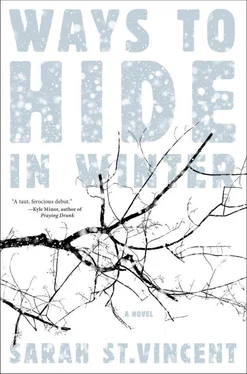I straightened the blanket and pulled the sheet up to her chest. She lifted her arms compliantly, looking up at me.
“Never mind about that,” I said.
I sat by her side, glancing up at the clock as the minutes ticked by. The thought of returning to the house alone, waking up there in the stillness in the morning, gave me a hollow feeling in my chest, a sensation I hadn’t felt for a long time.
“I’ve never seen the ocean,” my grandmother said abruptly. Her gray curls had fallen onto her forehead.
It sounded like a line from a movie, and maybe it was, but it gave me pause. “Well, neither have I.” I forced myself to smile and shrugged. The farthest I’d ever been from home was to visit my aunt Jeanine in Pittsburgh, years earlier, when I was a child. “Not much chance of that in Pennsylvania, I guess.”
Turning her head, she squinted and gave me a hard look. “You say that like this is the only place there is. Like they’ll come and lock you up if you try to leave.”
I closed my eyes. “I don’t think that.”
“Well, you must. Why else are you still here?”
I looked down at her, her meager form under the blanket, the needle in her hand, the cloudy eyes that shifted back and forth, unable to bring my face into focus even though I was no more than two feet away.
“Let’s talk about this some other time,” I said.
“You think I can’t take care of myself?” she rasped. “Phuh. You’re just stubborn.”
“Some other time,” I said again.
“I don’t need anyone to take care of me. You think I got through seventy-five years of life without figuring out how to clean up after myself? You’re just afraid of going anywhere. You’re afraid of everything.”
“No, that’s not fair. And I’m sorry you’re sick, but—”
“And another thing.” She inhaled, evidently preparing to deliver the knockout blow, but was seized by coughing. Her face reddened as she hacked, glaring at me. I stood and watched her as she caught her breath, and thought that it was remarkably difficult to tell the difference between when she was irate and when she was frightened. Maybe, as I would understand much later, there was no real difference.
A nurse passing by in the hallway leaned her head into the room.
“Visiting time is over,” she told us in a sing-song voice.
Outside the room, the nurses were beginning to dim the lights, rolling carts away with a clattering sound. I wandered slowly toward the elevator, turning corners, watching the white walls pass by beside me, the nurses’ desk appearing and disappearing like an island in the sea. The place smelled the way hospitals always smell, the sharp scent of iodine and sickness, and I quickened my pace, wanting nothing more than to be home.
After a few minutes, I passed the nurses’ desk again, unable to remember whether it had been on my right or left when I’d seen it before. Trying a different corridor, I did my best to pay more attention, peering around me, soon reaching a dimly lit row of rooms that had curtains instead of doors. Increasingly confused—I couldn’t remember having passed this part of the ward on my way in—I approached a rectangle of light where one of the curtains was drawn back, thinking I might find a doctor who could tell me where to go.
Instead, I found an empty bed, a jumble of cardboard packaging, a glass cabinet filled with small white boxes and bottles. I almost turned around and walked back out, but something—probably no more than the working drudge’s instinctive curiosity about places she isn’t supposed to be—made me linger.
The labels on the boxes were small but distinct, black against white. As I read them, my eyes widened. Without realizing it, I raised a hand to my mouth.
It wasn’t possible, I thought. This was some kind of joke. A trap.
There was no sound from the corridor. The glass panes of the cabinet reflected the fluorescent lights, bright and blank.
Reaching out tentatively, I touched the glass. The bottles that interested me were right in front of me, just above eye level, plain as day.
A strange sensation ran through me, cold and unsettling. For a moment, I had a feeling of suspension, of being genuinely unsure whether I was dreaming or awake.
I touched the lock with a fingertip, tracing it, tapping it gently with a nail.
The square of darkness behind me remained dark.
Looking around, I slipped my hand into my pocket and found a hairpin, straight and smooth against my fingertips. I closed my fist over it and drew it out, my stomach jolting. I was just testing, I thought, feeling the rough edge of the slot. It was almost like a game. After all, they couldn’t really have left something like this where somebody could get at it. Not even in a two-bit town like this one.
I pinched the hairpin between my fingers, turning my body so my hip nearly rested against the lock, bowing my head so my hair shielded my face. The tip of the pin scratched the coppery surface; it wasn’t an easy fit, but the thing was narrow, narrow enough to—
“Ma’am?”
I whirled around to find the blond nurse glowering at me, her clipboard dangling at her side, her mouth a straight line.
I yanked my arm back.
“Oh,” I said, my voice strangely thin. “I was just—I was just looking. I thought you might have some Tylenol. I have a headache.”
The obviousness of the lie seemed to irritate her further. “You can get Tylenol at the drugstore,” she said flatly. Brushing past me, she rattled the door until the panes shook, making sure it didn’t open. “There are police on the ground floor around the clock, ma’am. Don’t do something you’re going to regret.”
I looked at her, swallowing, not knowing how to respond.
She turned and marched toward a staircase, and with a sick feeling I understood that I should follow her. That I had to. That she was escorting me out of the building.
When we reached the entrance, I turned to say something to her, my face flushing, but by then she was gone.
When I pulled into the driveway, it was profoundly dark, not a single light shining in the neighborhood except the bulb on my grandmother’s porch. I cut the engine and sat, listening to the cooling motor tick in the silence, feeling the air around me lose its warmth.
Finally, I climbed out and leaned back against the Jeep. The stars were brilliant, piercingly white. I tipped my head back, feeling the cold metal against my scalp. My arm and hip ached, and the skin over my cheekbones seemed to draw tighter. I could see my coat collar tremble as my heart beat.
At last, I walked into the empty house, the same person I always had been, the same person I always would be. I sank into a chair by the dining room table, looking down at my hands. Minutes passed, and then hours, as I willed myself to dissolve into the darkness around me, to become simply part of the night.
The stranger and I were sitting together on the porch when the cars suddenly appeared, four of them, pulling into the park one after another. I had been fretting about my grandmother, who had come home with a shining gray oxygen canister in tow. My father had driven her, and when he’d attempted to carry her from the van to the house, she’d smacked his arm and waddled to the front door herself, looking from behind like an angry duck. She’d promptly settled into her usual place on the couch and, for the past two days, had been refusing to speak to anyone.
A small crowd of men came toward us across the parking lot, eight or nine of them, talking and laughing, pointing out over the view. Before I could even turn toward the stranger, he had slipped under the railing and disappeared around the corner of the building.
“Well, this is quaint, isn’t it?” one of the men said as they came onto the porch, their steps heavy on the boards. They were a range of ages but all dressed similarly, in jeans and tough but expensive-looking coats, sturdy boots with logos on them. They moved the same way, too, arms crossed or hands on hips, as if they were evaluating the things around them, ready to recommend changes to anything that wasn’t up to standard. Two had ponytails; several had wire-rimmed glasses that made them look like professors, or like the computer salesman in Carlisle who had acted as if he couldn’t quite bring himself to notice me, years earlier, when I’d stopped in to see if I could afford to buy something.
Читать дальше












